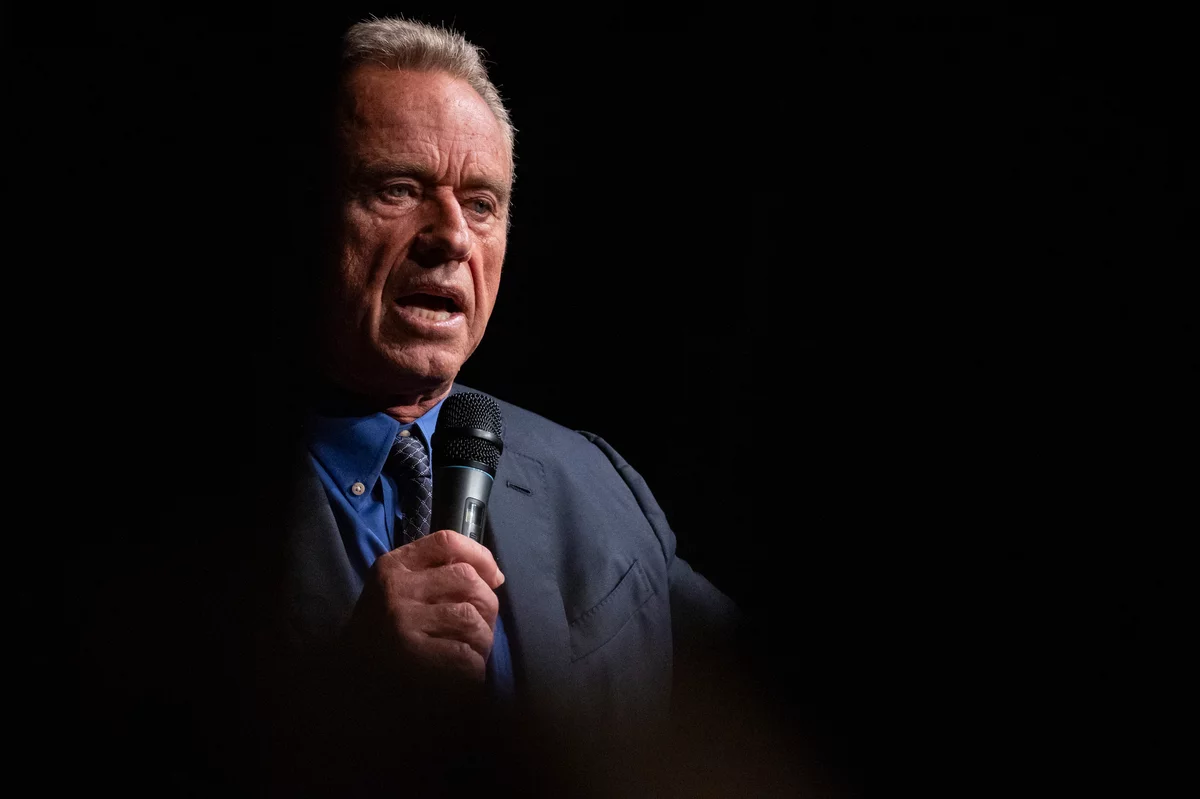
- Details
- By Neely Bardwell
Native Vote 2024. In recent weeks, the third-party campaign of Robert F. Kennedy, Jr. seems to be imploding. Kennedy once polled over 20% of the vote and was considered a risk to siphon votes from both major party presidential candidates, now coming in at about 5% of the vote.
On August 4, a Sunday, Kennedy described a 2014 incident involving a bear cub in a video that was posted to social media, adding it would be included in a New Yorker article that he expected to be damaging to him and his campaign.
The article was published the following day, August 5, and included a photo of Kennedy with his fingers in the bear’s bloodied mouth, a mock grimace on his face. His left pant leg appears to have a bloodstain on it.
In the video Kennedy posted, he recounts the story to actress Roseanne Barr. He says he was heading to a falconry excursion with friends when a woman driving ahead of him hit and killed the young bear with her vehicle. He says he put it in his vehicle, intending to skin it and eat the meat, but the day got away from him. Eventually, he decided to dump the bear while in New York’s Central Park.
He claimed his friends came up with the idea to stage the bear as a prank. At the time, bicycle accidents were getting significant media attention, so Kennedy and his friends thought it would be funny to make it look like the bear was hit by a bicycle.
Back in May, Kennedy acknowledged a parasite lodged in his brain and died. He denied eating a dog after a friend shared a photo with Vanity Fair magazine showing Kennedy dramatically preparing to take a bite of a charred animal; Kennedy said it was a goat.
On Monday, August 12, a New York judge ruled that independent presidential candidate Robert F. Kennedy Jr. will not appear on the state’s ballot in November. This comes after he falsely claimed that he lived at a friend’s house in New York on his qualifying petitions.
The barring of Kennedy from the November ballot comes after the Clear Choice super PAC challenged his application for ballot access citing inaccuracies in his paperwork. In Albany County, Supreme Court Justice Christina Ryba’s decision ruled Kennedy had claimed he resided in the spare bedroom of the friend’s house in Katonah, N.Y when he didn’t. It turns out that he stayed there for only one night.
New York is the first state ballot Kennedy will not be on if the decision is upheld. Kennedy stated he plans to appeal the decision. Now, other states may be open to investigating their ballot applications. He used the same Katonah address in all of his election filings nationwide.
In a statement, Kennedy called the decision anti-democratic saying, “The Democrats are showing contempt for democracy. They aren't confident they can win at the ballot box, so they are trying to stop voters from having a choice.”
Kennedy managed to avoid another loss in a North Carolina decision after Wake County Superior Court Judge Keith Gregory rejected the preliminary injunction request by the North Carolina Democratic Party, which challenged the board’s decision last month that declared We the People an official party.
State Board of Elections staff last found We The People organizers turned in enough valid signatures from registered and qualified voters to exceed the petition threshold in state law, which is currently 13,865. Petition collectors also must inform the signers of the general purpose and intent of the proposed party.
The state Democratic Party filed a complaint seeking the board’s decision be reversed, accusing Kennedy’s campaign of using the We the People title to evade the tougher standard that state law sets for independent candidates to get on the ballot. Independent candidates must collect six times as many signatures.
To win a presidential election, a candidate must win the electoral college vote. If a candidate cannot be on all 50 state ballots, there is virtually no chance of ever getting elected.
Kennedy supporters must decide if a vote for him is a throw-away vote.
More Stories Like This
Native News Weekly (August 25, 2024): D.C. BriefsNavajo Nation Mourns the Passing of Former Vice President Rex Lee Jim
Deb Haaland Earns Endorsement From Communications Workers of America Local 7076
University Soccer Standout Leads by Example
Two Native Americans Named to Democratic Congressional Campaign Committee's“Red to Blue” Program
Help us defend tribal sovereignty.
At Native News Online, our mission is rooted in telling the stories that strengthen sovereignty and uplift Indigenous voices — not just at year’s end, but every single day.
Because of your generosity last year, we were able to keep our reporters on the ground in tribal communities, at national gatherings and in the halls of Congress — covering the issues that matter most to Indian Country: sovereignty, culture, education, health and economic opportunity.
That support sustained us through a tough year in 2025. Now, as we look to the year ahead, we need your help right now to ensure warrior journalism remains strong — reporting that defends tribal sovereignty, amplifies Native truth, and holds power accountable.
 The stakes couldn't be higher. Your support keeps Native voices heard, Native stories told and Native sovereignty defended.
The stakes couldn't be higher. Your support keeps Native voices heard, Native stories told and Native sovereignty defended.
Stand with Warrior Journalism today.
Levi Rickert (Potawatomi), Editor & Publisher


